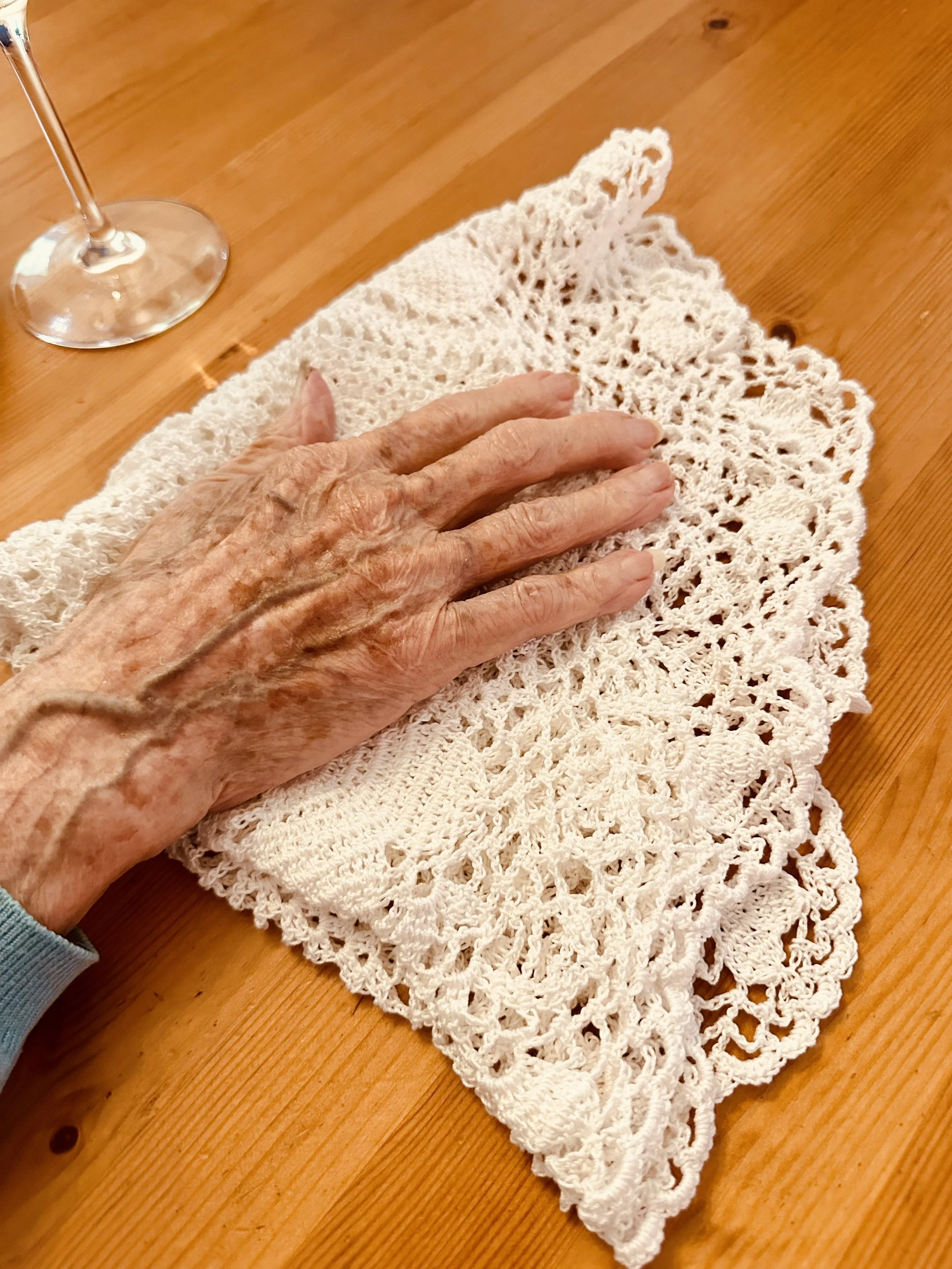Kitchen Table Wisdom
Saturday morning, as the sun lifted gently over the trees of FoxHaven and the coffee brewed strong and dark, I sat in the quiet reverence of family. Not the quiet of silence—but of presence. Of lives knit together by memory, by laughter, by weathered stories that refuse to be forgotten.
My husband and his almost 99-year-old mother were deep in conversation, voices soft but sure. They spoke of cousins long gone and children now grown, of quilts sewn from scraps and soup made from nothing. And then, as if slipping seamlessly from the ordinary into the eternal, she said:
“I’m not afraid of death. It’s the dying I’d rather not experience.”
That stopped me mid-sip.
It was one of those sentences you can’t un-hear. One that lands in your chest like both a punch and a benediction. There’s something fierce and funny in it, classic elder wisdom. The kind you don’t find in books but only on porches, around kitchen tables, and in the pews of old churches. She wasn’t being dramatic or poetic, just honest. Pragmatic. As if death was a long-expected guest, but dying… well, that part was the messy hallway before the door.
It got me thinking about the strange choreography of aging. The body falters but the spirit often sharpens, and if we are lucky, not into cynicism, but clarity. This woman, who has lived nearly a century, wasn’t offering advice. She was simply being. And in her being, she taught me something invaluable.
Later that day, I attended a Memorial Mass at my little stone church. The pews were filled with people shoulder to shoulder, hearts full and eyes glancing upward. We came to remember the dearly departed. Names spoken softly and aloud. Candles lit. The organist played every funeral hymn I’ve ever cried to. It undid me.
And in that undoing—in the soft, silent shattering of held-together grief—something opened. And there they were. All those I’ve loved and lost, waiting in that holy hush. Memory is a powerful thing. Not just a recollection, but a visitation. A gathering of souls around the altar of the heart. We processed to the graveyard and offered more prayers amidst the scent of blooming lavender.
And then—Sunday came in like a feast after a fast.
Family poured into FoxHaven—cousins, siblings, a niece and a nephew-in-law who showed up in a vintage car gifted to him by his father. Everyone brought something: a story, a cake, a tray of cheese, a side of sass. We gathered around the long table like pilgrims to a sacred meal, a table that echoed the harvest spreads of their shared childhoods—generous, loud, and just the right amount of chaotic.
These are farmers—salt-of-the-earth folks who know the value of a well-timed joke, a second helping, and a well-buttered cob of corn.
We came to kick off the 99th birthday celebrations of my mother-in-law, the indomitable matriarch who’s lived through more seasons than most oak trees. And what a gathering it was. Laughter ricocheted around the room. Hugs lingered just long enough to mean something. And beneath the clatter of cutlery and the symphony of second helpings, something sacred was unfolding—woven into the potato salad, hiding in the folds of the cabbage rolls, and pulsing in the stories told between bites.
At one point, she brought out a bundle of doilies—delicate, intricate, stunning things she’d crocheted over the years. Her handiwork. Her legacy, looped and laced into being in the quiet hours. She offered them freely—take one, she said, or two. And we did, not with casualness but with reverence. We knew what we were holding. We knew what she was offering. Not just lace, but love. Not just handiwork, but inheritance. Her fingers had woven beauty into being—and now we’d carry it home.
Like our lives—woven together in unexpected, beautiful patterns.
Like memory—fragile and fierce, holding the past in the present.
Like grief and joy—companions more than opposites.
Like the threads of faith, family, and the women who lead us not with declarations, but with doilies, a recipe, and kitchen-table truths.
There is no such thing as an ordinary family reunion.
Because every time we gather, we are quietly refusing the isolation of modern life. We’re letting the wisdom of the eldest mingle with the questions of the youngest. We’re tending a lineage, even if we don’t always know what it means. The land itself seemed to lean in, like the trees wanted to listen in on the tales being told and the new ones taking shape like dough in a child’s hands.
We feasted. We laughed until our sides ached. We argued about how to properly set the table (forks up or down?). And someone, eventually, snuck off for a nap. No one blamed them.
So now, as evening settles and we lean back in our chairs—tired, happy, and delightfully overfed—the fridge full, the hearts fuller—I offer this little toast from our table to yours:
May the stories flow freely and the interruptions be worth it.
May the dogs get just muddy enough to make it memorable.
May the ones we’ve loved and lost show up in the best ways—through laughter, through stories, through the clink of a glass.
May the aging be honoured, the wise listened to, and the dying—when it comes—be gentle and kind.
May love hold its shape, even when we’re apart.
And may we always treasure the beauty of a life well-lived one perfectly imperfect Sunday at a time.
From FoxHaven,
with gratitude and a full heart—
Muriel
